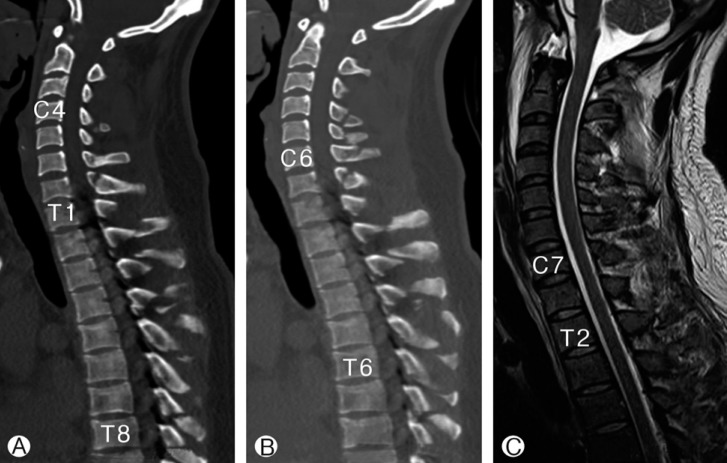Twelve Contiguous Spinous Process Fracture of Cervico-Thoracic Spine
Article information
Abstract
The clay-shoveler's fracture is an isolated avulsion fracture of the lower cervical or upper thoracic spinous process. Among them, multiple spinous process fractures are very rare. We present 34-year-old male patient who have multiple spinous process fractures with twelve contiguous levels of cervico-thoracic spine (from C4 to T8) after motorcycle accident. This case is multiple isolated spinous process fractures with good clinical outcome.
INTRODUCTION
Clay-shoveler's fracture is isolated spinous process avulsion fracture classically observed in the lower cervical or upper thoracic spine. This type of fracture is most common in those who engaged in hard physical labor3,6,7). Recently, several cases of isolated spinous process fractures that are caused by motor vehicle accidents or sports injuries have been reported (Table 1). Isolated spinous process fractures are most common at the level of T1, followed by C7, T2, T3, and C61,7). Among them, multiple spinous process fractures are very rare1). We present a case of multiple isolated spinous process fractures with twelve contiguous levels of the cervico-thoracic spine, which extended from C4 to T8. To the best of our knowledge, this case is the most multiple spinous process fractures so far reported in the literatures.
CASE REPORT
A 34-year-old man was transferred our hospital from local clinic after motorcycle accident. Physical examination revealed an extensive tenderness from the posterior neck to upper back. Neurological examination was normal. Initial spine X-rays showed multiple spinous process fractures in the cervico-thoracic spine. Computed tomography (CT) scanning of the cervicothoracic spine showed twelve contiguous spinous process fractures ranged from C4 to T8 (Fig. 1A, B). Cervico-thoracic spine magnetic resonance images (MRI) revealed that spinal cord was normal and there was no additional soft tissue injury (Fig. 1C). The patient was treated conservatively, which included analgesics and muscle relaxants. Immobilization was maintained for 4 weeks with cervical collar and thoraco-lumbar brace. After 3 months, we evaluated follow-up cervico-thoracic CT scanning which didn't show union of spinous process fractures yet. After 6 months follow-up, visual analogue scale score was gradually improved from 6 to 1. The patient showed no neurological deficits also.
DISCUSSION
Clay-shoveler's fracture may occur through direct trauma on the flexed spine or through shear forces2,3,4,5,6,7). It can be occurred in hyperextension, hyperflexion, or rotation of neck2,4,5,6,7). Muscle and ligamentous stress is transmitted through the supra-spinous ligaments and results in an avulsion fracture of the spinous processes2). Our case is an unusual example for multiple spinous process fracture that can be produced by several mechanisms, such as a direct blow to the posterior aspect of lower neck and the thorax, upper back hyperextension, and hyperflexion injuries against the supraspinous ligament after motorcycle crash.
An useful imaging study for this fracture is radiography3,6,7). A double spinous process sign at the affected level can be detected on simple antero-posterior radiographs6,9). Downward displacement of fractured spinous process fragments (spinolaminar breach sign) can be seen on lateral radiograph views3,6,7). Isolated spinous process fracture considered as a warning sign for more severe spinal injury, so it should be evaluated carefully to detect more severe spinal injuries7). CT and MRI of the cervical and thoracic spine may be useful for detecting more serious spine fractures and further injuries to surrounding structures including spinal cord and ligament3,6).
These injuries are known to be stable but painful. Generally, this type of fractures are treated conservatively without the need for surgical intervention3,5,8). Immobilization and restriction of physical activity for 4 to 6 weeks generally result in good outcome3,8). Our patient shows good clinical outcome after 4 weeks immobilization and restriction of physical activity.
CONCLUSION
We report a case of twelve isolated spinous process fracture of the cervico-thoracic spine after motorcycle accident. This case is multiple isolated spinous process fractures with good clinical outcome.

